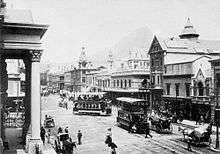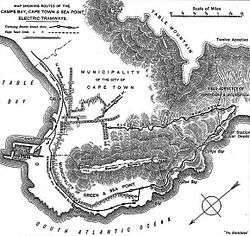Trams in Cape Town
Cape Town, South Africa, has had two tramway networks forming part of its public transport arrangements. Both networks are now long closed.
| Cape Town tramway networks | |||||||||||||
|---|---|---|---|---|---|---|---|---|---|---|---|---|---|
 Double-deck trams, cnr Adderley Street and Darling Street, Cape Town, ca. 1900. | |||||||||||||
| Operation | |||||||||||||
| Locale | Cape Town, South Africa | ||||||||||||
| |||||||||||||
| |||||||||||||
| |||||||||||||
History
The first of the two networks to be established was a horsecar network, which was opened on 1 May 1863. In around 1896, it was converted to electrical operation. From 21 December 1935, it was gradually replaced by trolleybuses, which were always referred to by English-speaking locals as "Trackless trams".[3] It was finally closed on 28 January 1939.
The other network, opened in November 1901, was an interurban tramway linking Burnside Road in Cape Town with Camps Bay and Sea Point. It was powered by electricity, and was in operation until 17 February 1930.
See also
References
Notes
- Coates, Peter Ralph (1976). Track and trackless: Omnibuses and trams in the Western Cape (1st ed.). Struik. p. 194. ISBN 0869770632.
- Patton, Brian (May 13, 2002). Double Deck Trams of the World Beyond the British Isles. Adam Gordon. p. 59. ISBN 1874422397.
- Jones, David (2005–2011). "Springbok Bus Roots: the Trackless Trams". Springbok Bus Roots. Retrieved 2 March 2012.
Further reading
- Coates, R P (1976). Track and Trackless: Omnibuses and Trams in the Western Cape. Cape Town: Struik. ISBN 0-86977-063-2.
- Gill, Fraser (1961). Cape Trams: From Horse to Diesel. Cape Town: Cape Electric Tramways. OCLC 25942319.
- Pabst, Martin (1989). Tram & Trolley in Africa. Krefeld: Röhr Verlag. ISBN 3-88490-152-4. (in English and German)
- Patton, Brian (2002). Double-Deck Trams of the World: Beyond the British Isles. Brora, Sutherland: Adam Gordon. ISBN 1-874422-39-7.
External links
![]()
- Camps Bay Tramways – a description of the line from Cape Town to Camps Bay and Sea Point
